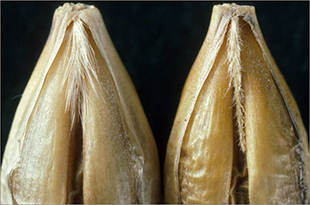What links APHA, Carl Linnaeus, Charles Darwin and hairy rachillas? Mara Ramans, Head of APHA's Plant Variety and Seeds team, explains...
How and why plant species are categorised
The need to identify living objects and categorise them into families for classification started over 3000 years ago. It is thought our ancestors began naming plants as a way to pass on knowledge about what was good to eat, what was poisonous and what plants could be used for.
Millennia passed and this process became much more sophisticated. The Linnean Society in London is the world’s oldest active biological society. Founded in 1788, the Society takes its name from the Swedish naturalist Carl Linnaeus (1707–1778) who’s botanical, zoological and library collections have been in its keeping since 1829. These unique collections are still a primary reference for taxonomy. Its many famous members, including Charles Darwin, started to publish classifications criteria to put groups of plants, animals and fungi into families of similar looking members.
APHA’s part to play

In APHA’s Plant Variety and Seeds team, we work on cereals such as wheat, barley and oats. These are all in a similar family of grasses called the Poaceae. Each is given Latin botanical names (genus followed by species name) which then allows further separation from each other and within their own genus, so wheat is Triticum aestivum, barley is Hordeum vulgare and oats are Avena sativa, and so on. Barley varieties for instance can then be sub-divided based on the hairiness of their ‘rachilla’ - the spikey bits at the top of the plant.
Having these Latin names, and also further sub division of species through the use of variety names, also helps us administer elements of our very sophisticated food production systems, where crops are bred to meet many nutritional and production requirements. In these cases, varieties have to be distinct from one another and that distinctness has to be stable and uniform, so down the line it can be reproduced to maintain all the properties that make it a distinct and unique variety.
Our job in the Plant Variety and Seeds team is to use such naming and other traceable features to ensure breeders’ material is properly evaluated and seed is produced to the correct standard for farmer's use. This is done through maintenance of national lists of approved varieties for commercial sale and our monitoring of plant breeders rights. It is through this second route that breeders receive royalties for their registered varieties in return for their expertise in breeding new varieties, which can take ten years or more to bring a new variety to market. These routes ensure that a traceable and consumer protected product eventually arrives at our breakfast table, or is being fed to your pet or our farm animals. APHA operate these schemes through our small team of 11 working out of the APHA Cambridge office.
Making a list and checking it twice
Varieties that make it onto our 'national lists' also need to have value for cultivation and use, defined as better yield, disease resistance, or special properties for beer or bread making. This and other data is looked at by a committee of APHA and devolved authority partners, who with agronomists, judge it against historic information so that the UK farmer has the best evaluated choice of what to grow in our conditions. In turn our national lists are then scrutinised internationally and compared with those of other nations through the International Union for the Protection of New Varieties of Plants (UPOV) which ensures variety’s uniqueness in DUS (Distinctness, Uniformity and Stability) testing around the world.
So, if asked, you can now say what links APHA, Carl Linnaeus, Charles Darwin and ‘hairy rachillas’ thanks to the work of our Plant Varieties and Seeds team. If you want to find out how different levels of 'hairy rachillas' define different barley varieties and how APHA play a part in this and defining many others, take a look at UPOVs website or contact me in Cambridge.
Follow APHA on Twitter and don't forget to sign up to email alerts.

Recent Comments